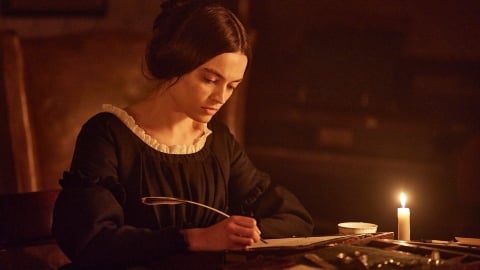Actress Frances O’Connor makes her directorial debut with a biopic about Emily Bronte, who wrote one great novel: Wuthering Heights. The director imagines what prompted the young writer to tell the story of a love he suffered. Carola Proto Review
About thirty years separate writing Mansfield Parkthe third book Jane Austenfrom the first and only novel Emily, Brontewhich Wuthering Heights which is perhaps the most beautiful, or at least the most poignant and intense work of the British nineteenth century. Children from a different era in UK history – Guardianship on one side and the Victorian era on the other – could be related because the lead actress in 1999’s adaptation Mansfield gardenthat it Frances O’Connor, He wanted to direct, not switch Wuthering Heights But a biography of its author, many mistakenly identify it as the “Sphinx of English Literature” and it remains an elusive figure to this day. Also, a manager Emily He wanted to put in a sister figure Charlotte And Anne Bronte Even a little bit of one’s own experience, plus something like that Wuthering Heightsstarting with the Yorkshire moor and passion that, later in the nineteenth century, someone would have renamed Sturm und drang.
EmilyFinally, it makes us think of an author whatever And pride and prejudice Because it kind of reminds us of the story in pictures and existence Austin who was the main performer American actress Anne Hathawaywhich become Jane Which and how emily, Determines in deep emotional disappointment the origin of the book about universal love
Back to setting O’Connor with whom it was invented Heathcliff And CatherineThe closeness between the two women allows the film to do justice to one of those contemporary female creatures who feel free, open, independent and at the same time sensitive, sympathetic, and self-absorbed. We will not underestimate the fact that the heroic young woman from a kind family has her face Emma Mackey It is a symbol of female empowerment, but only there is a link between the mid-nineteenth-century artist and the modern-day woman of good wit. Everyday life changes, and certainly in the nineteenth century morals were more chivalrous but the public mentality less open, but the desire of the gifted to find a place in the world was the same.
Recent work from before Frances O’Connor Then lies the complexity of the female protagonist, who calmly embraces one thing and its opposite and may not be looking for a soul mate but realizes that only a shared feeling can bring her closer to a man. Of course, the value William Whitman who makes her heart pound, ends up being stupid, scared and selfish, but in the end the true love story of the movie is the bond that unites Emily to his brother Branwell, a very vulnerable and sensitive man, but deep and noble. In building the relationship between the two characters, the director draws again from a cauldron Wuthering Heightsinspired by attach Heathcliff to Catherine Based on Catherine to Heathcliff. The same Emily has something Heathcliffeven if it was sadder.
But do you not think that this melancholy is the limit of depression, an evil of our century as well as of the previous one? We think so, and he has a sense of the need on the part of the director and screenwriter, to listen more and more to understand the nuances of the unease or feeling, which in the case of the sisters Bronte He finds full expression and solace in prose and poetry. After all, since the dawn of time artistic talent has often coincided with an underlying restlessness, with a sense like a fish out of water among men but with the earth, the grass, the trees, in a word with nature.
Another great advantage of Emily It is the near complete abandonment of the clichés of the arrangements of the great English novels of the day. There is no usual flood of candles, bonnets, carriages and marriage proposals. Here, the movement of the tableau, which results from a fixed camera in the middle of the luxurious furnishings, contrasts with great dynamism, which becomes an almost circular movement when O’Connor He decides to switch to a manual camera. The image itself is not shiny, nor does it look like a miniature with its graceful statues, but it is realistic and not limited to vision only. And in fact, you seem to feel the wet grass on your hands, and even feel the wind beating on your cheeks or the faint heat of the sun that sometimes seeps from the clouds.
Fundamentals of Emily Bronte They will say that the director took a lot of poetic license in building her hero. That may be true, but what’s the point of making a movie that’s almost identical to a book? In this sense, isn’t betrayal more artistic? And in any case, it’s not a betrayal of the spirit of the business, or an excuse to apply #MeeToo or politically correct labels to characters from the past, as happens with colorblind casting. no, Emily She seems to have understood the poetics and inner world of a great writer, which can reach us through the powerful language of cinema.

“Lifelong beer expert. General travel enthusiast. Social media buff. Zombie maven. Communicator.”


